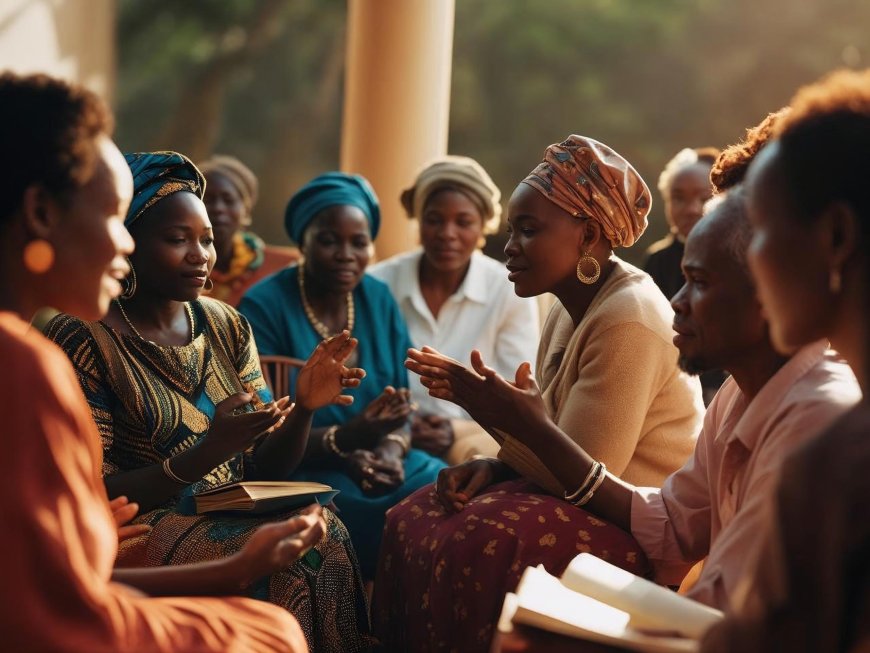Storytelling for Health: How Narratives Drive Better Outcomes
Discover how storytelling is changing healthcare in Africa—from patient education to mental health therapy. Learn why a good story could be more powerful than a pill, and why our grandmothers may have been our first public health experts.

"Wisdom is like a baobab tree; no one individual can embrace it." – Akan proverb (Ghana)
Long before PowerPoint presentations and blood test results, Africans passed down wisdom through stories. Tales of Kwaku Ananse, the hare and the lion, or the wise old woman in the village weren’t just for laughs—they were early health education disguised as bedtime theatre.
Fast forward to 2025, and guess what? Science is finally catching up. Turns out, storytelling isn’t just cultural—it’s clinical. From maternal health campaigns in rural Kenya to cancer survivorship programs in Johannesburg, narratives are improving health outcomes across the continent.
Let’s unpack this, shall we?
1. The Science of Stories: Why They Work
According to research from the Centers for Disease Control and Prevention (CDC), storytelling increases information retention, builds empathy, and lowers psychological resistance—especially among populations with low health literacy.
Put simply: People may forget a fact, but they rarely forget a good story.
In one Ugandan HIV awareness program, drama groups staged real-life stories of stigma, diagnosis, and treatment. The result? More people turned up for testing—and stuck to treatment (UNAIDS, 2021).
2. A Story Instead of a Lecture? Yes, Please.
Imagine this:
-
Version A: “Take your TB medication every day for 6 months, or you’ll relapse.”
-
Version B: “There was once a man named Omondi who stopped taking his pills after he felt better. Weeks later, he was coughing again—worse than before…”
Which version do you think sticks?
Exactly.
Narratives reduce resistance, invite self-reflection, and deliver complex medical messages in a way even your gossip-loving auntie in Lagos can understand.
3. Digital Storytelling: Grandma Goes Multimedia
Tech platforms are turning traditional oral storytelling into modern public health tools.
-
Shujaaz Inc. (Kenya): Uses comic books, social media, and radio to tell relatable stories about youth health, sexuality, and entrepreneurship.
-
Soul City Institute (South Africa): Has been creating health-themed TV dramas for over 20 years, influencing policies and saving lives—one soap opera episode at a time.
In the words of one viewer from Soweto: “That woman on TV had breast cancer just like my sister. Because of her, we went to the clinic early.”
That’s narrative medicine in action.
4. Mental Health and Healing Through Story
In Egypt, storytelling therapy—called Hikayat—is helping trauma survivors share experiences through structured narrative groups. Meanwhile, Nigerian NGOs like Mentally Aware Nigeria Initiative (MANI) are using Instagram reels and storytelling threads to destigmatise depression and anxiety.
Clinical studies support it: Patients who write or speak their stories show lower cortisol levels, reduced PTSD symptoms, and better medication adherence (Pennebaker & Smyth, 2016).
In other words, talking about your pain might just heal it.
5. Health Workers as Storytellers, Not Stat Machines
Here’s the thing: Patients don’t just want to be told—they want to be understood.
Doctors trained in narrative medicine (like at The Narrative Medicine Program at Columbia University) learn to listen to the patient’s story, not just ask about their symptoms.
Because, as one wise Ghanaian nurse said:
"If you treat the disease, you might cure it. But if you treat the person, they’ll heal."
6. But… Is It All Kumbaya and Campfires? Not Quite
Storytelling isn’t a magic bullet. It can spread misinformation too—just ask the WhatsApp uncle who thinks ginger cures COVID. That's why storytellers must be trained, guided by evidence, and locally grounded.
It’s not enough to tell a story—you must tell the right story.
Final Word: “When the Story is Sweet, Everyone Wants to Tell It”
The future of healthcare in Africa isn’t just digital—it’s narrative. When you combine culture, empathy, and creativity, you don’t just treat illness—you build healthier societies.
So next time you design a health campaign, write a patient brochure, or explain a diagnosis to a mama in Mombasa, don’t quote a medical journal. Tell her a story.
Because as our elders say:
"A single bracelet does not jingle." – African proverb.
It’s time our data jingled with our stories.
References
Centers for Disease Control and Prevention. (n.d.). Entertainment Education & Storytelling. https://www.cdc.gov/healthcommunication/toolstemplates/entertainmented/storytelling.html
Mentally Aware Nigeria Initiative. (2024). Storytelling for mental health awareness. https://www.mentallyaware.org/
Pennebaker, J. W., & Smyth, J. M. (2016). Opening up by writing it down: How expressive writing improves health and eases emotional pain (3rd ed.). Guilford Press.
Shujaaz Inc. (2024). Youth stories for social change. https://www.shujaazinc.com/
Soul City Institute. (2024). Changing lives through edutainment. https://www.soulcity.org.za/
UNAIDS. (2021). Community stories reducing HIV stigma in Uganda. https://www.unaids.org/en/resources/presscentre/featurestories/2021/august/20210812_uganda-hiv-awareness
What's Your Reaction?
 Like
0
Like
0
 Dislike
0
Dislike
0
 Love
0
Love
0
 Funny
0
Funny
0
 Angry
0
Angry
0
 Sad
0
Sad
0
 Wow
0
Wow
0




















































